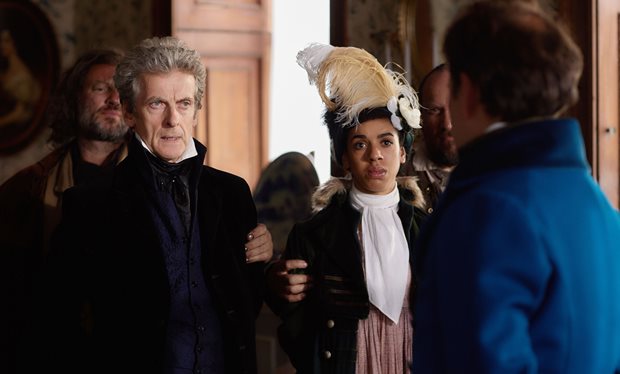
This season is bit of a reset for Doctor Who, returning to traditional sequences for a new companion. First there’s the introduction, then a trip of the future. So what’s next? A trip to the past of course! But another lesson the new guest on the TARDIS learns is that The Doctor isn’t all fun and games. There’s a pragmatism to him that can seem heartless. And the past can be more dangerous than the future. Bill deals with both of these revelations in the fantastic “Thin Ice.”
The duo make their way out onto the Thames for the frost fair of 1814. Bill’s wide-eyed enthusiasm and desire to explore is as charming as ever. It’s great seeing her and The Doctor enjoy the fair. She’s drawn to the carnival attractions and he’s interested in the con artists around. But the tone takes a dark shift as a street urchin steals The Doctor’s sonic screwdriver, only to be swallowed by green lights under the ice. The Doctor immediately switches gears to investigate and discover what’s causing the problem. But Bill’s devastated at seeing the child die in front of her. She’s also shocked at The Doctor’s apparent lack of concern.
This confrontation is the first source of tension between the two of them. It’s superbly acted on both sides. Bill is horrified by the amount of people The Doctor’s seen die and that he’s killed himself. But The Doctor’s response fits him to a tee: if he doesn’t quickly move on from the deaths of others, more people die. Capaldi can be unflinchingly calculating in his portrayal of The Doctor. But it’s out of a sense of duty to save lives, not out of cruelty. It’s a better take on similar conversations from early in his tenure, when his cold logic came off as callousness.
“Thin Ice” is also unafraid to tackle the racist past or whitewashing efforts of the present. Bill worries about going out in an era where slavery still exists. But she finds the fair much more tolerant than the history books led her to believe. As the Doctor says, history’s a whitewash. This isn’t a dismissal of racism though. A direct confrontation with prejudice comes in the form of the episode’s villain: the despicable Lord Sutcliffe. As soon as he sees Bill, he starts belittling and demeaning her, only for The Doctor to clock him in the face. That cool exterior has breaking points. The Time Lord follows up the punch with a beautiful speech about the value of every life, no matter how much money or privilege you have. It’s another incredible performance by Capaldi, low-key and restrained in its power.
Sutcliffe isn’t impressed. Instead, he intends to blow apart the frozen Thames with everyone on it, offering plenty of food for the benign sea creature trapped below. Its waste is being turned into a high-end fuel, so Sutcliffe is making a fortune out of selling the stuff. Handing the decision to Bill, The Doctor rearranges the trap to free the sea creature, who eats Sutcliffe before making its way out to sea.
“Thin Ice” is the best episode of this season yet. Sarah Dollard crafted this episode with a level of skill and care that may fall flat in a lesser writer’s hand. Not only does it take on The Doctor’s hard edges, but it doesn’t shy away from the racism of 19th century London. Bigotry is met head-on with condemnation. The appreciation is saved for the diverse people out at the frost fair together.
Assorted Thoughts:
– “Thin Ice” has some laugh-out-loud moments too. Bill’s reaction when she learns that the sea creature’s droppings can burn underwater: “No shi–”
– For The Doctor, it doesn’t count as wrestling unless it’s in zero gravity with tentacles.
– Doctor, don’t try to be “down with the kids.”
– “You don’t steer the TARDIS, you reason with it.”
– There are some loud knocks coming the vault at the end of the episode. Hmm…
